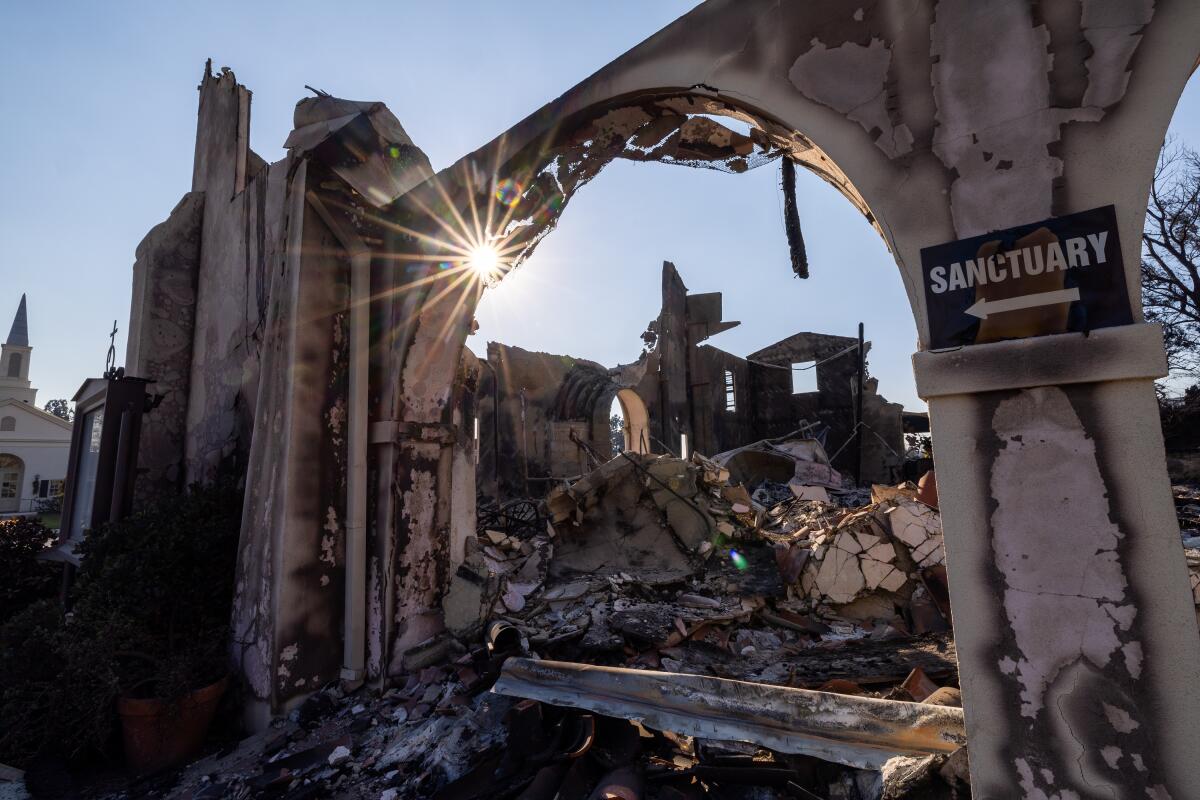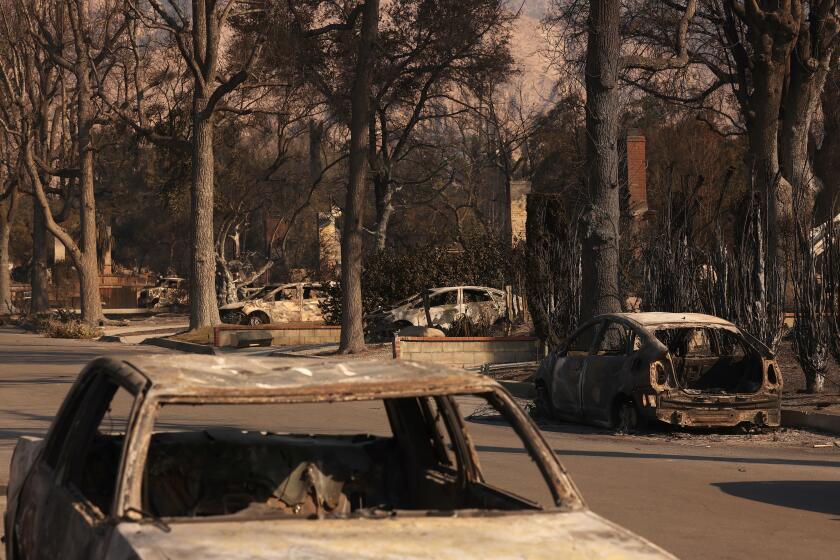Opinion: Beautiful Altadena’s one-of-a-kind town was destroyed. But we can rebuild

- Share via
When asked what was the best place for lunch in Altadena, I often recommended Fox’s Restaurant on north Lake Avenue. Their elevated take on the BLT — stacked with roasted red pepper and goat cheese — paired well with a crisp Sauvignon Blanc. For dinner, the generous plate of fish and chips was a must. The kitschy diner’s decor remained preserved in time from a long-gone era, at pitch-perfect odds with its elegant menu items.
Now all that remains of Fox’s is a blackened sign with its iconic cartoon red fox logo. The rest of it was flattened into a pancake of soot and ash and the dreams of Altadena’s quirky community within 24 breathtaking hours of lightning-speed flames, which cut homes in half and lacerated historic structures.
On the other side of north Lake Avenue sat Rhythms of the Village, another family-run business and an African marketplace whose designer daishikis and weekend outdoor drum circles were overseen by esteemed griot patriarch Baba Onochie. Now there are bones of the building where drums once lived. Echoes of hands smacking stretched hides haunt the emptied streets of Altadena, a vibrant community attracting vegans and coffee connoisseurs, artists and thrifters, pot smokers and hikers, Black homeowners and Mexican restaurateurs, young white gentrifiers and old white hippies, immigrants and sundry others.
The Eaton fire cut a brutal swath through Altadena and a cherished way of life in this eclectic foothill community it upended.
Although I technically live in Pasadena, just a couple blocks south of the Altadena border, I have considered myself an honorary Altadenan for decades. For years my kids attended Oak Knoll Montessori School, perched at the apex of the town and now burnt to a crisp.
Splayed out at the base of the San Gabriels, Altadenans have prided themselves on living within the borders of Los Angeles’ best-kept secret: a picture-perfect combination of natural beauty, rambling wooden homes and an increasingly hip dining scene.
Now, “Beautiful Altadena,” a moniker painted on murals and printed on T-shirts and totes, is at death’s door, gasping from the ferocious assault of the Eaton fire that came roaring like a dragon down the slopes of the mountains last week, cutting everything in its path.
Beautiful Altadena lost 16 souls (and counting), thousands of structures and countless happily-ever-afters. If you lived or ran a business in Altadena, you may well have lost it all in one catastrophic day.
As of this writing, a couple dozen people I know as friends, acquaintances or community members have found themselves suddenly unmoored and unhoused. Somehow my Pasadena home was spared, though my family did have to evacuate on Jan. 7.
For a particular creative community, Altadena represented one of the last great affordable places in L.A. to raise a family. The Eaton fire left those homes in ashes, and destroyed one vision of the L.A. dream.
Most things worth doing in the very northern reaches of Pasadena were in Altadena: skin ink from the talented ladies of June Bug Tattoo parlor, inventive pizza from Pizza of Venice and Side Pie, coffee with a view from Café de Leche, exceptional musical theater at Farnsworth Park and a weird good time at the Bunny Museum. All are gone, wiped out in the blink of a night’s eye, leaving behind a toxic snow of ash.
What is to become of Altadena? Neither a popular home for A-list celebrities (having more B-listers was always part of its charm), nor the stomping ground of elite politicos, this unincorporated part of Los Angeles County has never commanded much attention — by design.
Legendary sci-fi imagineer of dystopian futures Octavia Butler, fittingly buried in Altadena’s Mountain View cemetery, would have known what to say about the sudden wiping away of so many homes and businesses: how it wasn’t about this community choosing to live in a fire zone as much as it was about human-caused climate change and the hubris of the fossil fuel industry ending thousands of futures.
The names of those I know of who lost everything — a fraction of the thousands affected — haunt me: Corrina, Christina, Nelly, Chris, Mandy, Alex, Griffin, Liz, Andrew, John, Carlos, Beth, Victoria, Ceci, Ruben, Adina, Kiyana, Anna, Bouchra, Rich, Maria, Patrick, Mary, Meredith, George, Stella, Georgie, Anthony, Lori, Jesse, Sarah, Steven, Sandra, Jeff. These are people in my community who just a week ago had a home filled with dreams, even generational wealth, and now have little more than the clothes on their backs. Had the winds blown just a little longer, the names of my family members and immediate neighbors could have lengthened the list.
We cannot, we should not, chalk up Altadena’s near-death to chance and the terrible timing of dry, hot winds and no rain. We cannot succumb to mere platitudes of community resilience and grit, relying only on financially stretched neighbors to donate to each other’s crowdfunding campaigns for help while insurance executives decide how much, if anything, to dole out to survivors. We live in a world where most of us are getting by while a handful of billionaires and corporations thrive, consuming our futures with callous abandon.
This is about their greed set against our hope. It’s not just about us and our suffering. We don’t exist in isolation. Let’s keep that front of mind as we wipe away our tears and dust off the ash.
Sonali Kolhatkar is an award-winning journalist, a senior editor at YES! Media, host of “YES! Presents: Rising Up With Sonali” and author of “Rising Up: The Power of Narrative in Pursuing Racial Justice” as well as “Talking About Abolition: A Police-Free World Is Possible.”
More to Read
A cure for the common opinion
Get thought-provoking perspectives with our weekly newsletter.
You may occasionally receive promotional content from the Los Angeles Times.












